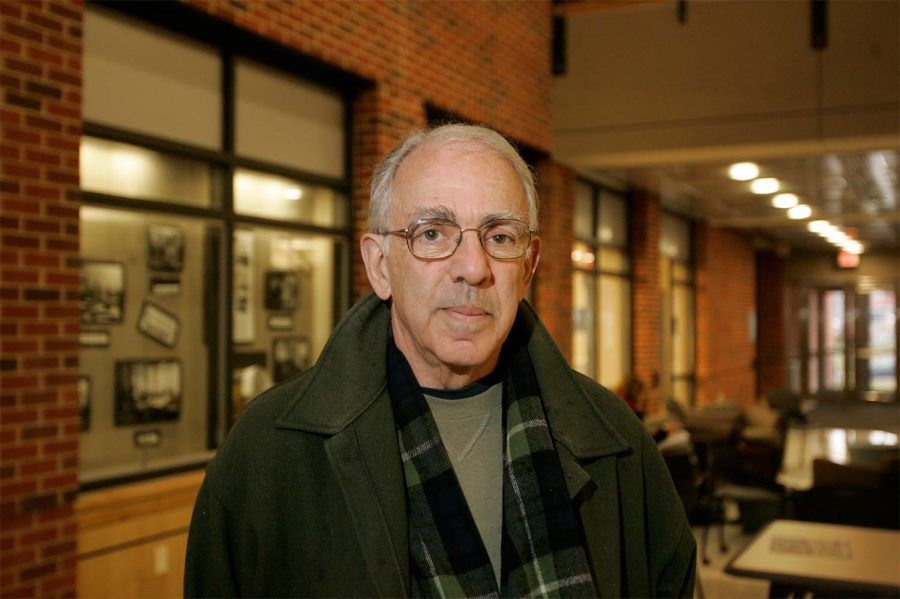Carl Klaus memorial garden at new Nonfiction Writing Program building to offer refuge and remembrance
Located at the new Nonfiction Writing Program building on the corner of North Clinton and Church Street, the Carl Klaus memorial garden will provide a space for nonfiction students and a tribute to the program’s founder and director.
Iowa Nonfiction Writing Program founder Carl Klaus stands inside Adler Journalism Building Monday, March 27, 2006. Klaus, the founder of the University of Iowa’s Nonfiction Writing Program, died in February 2022 and will be honored through a new garden.
November 15, 2022
A patio is lined with flowering hedges and neat rows of seedlings sweeping across a grassy stretch of yard. Sunlight dapples tables and Adirondack chairs through a shady pergola. A small fountain bubbles, dimming sounds of traffic from the nearby street.
This is the vision for the Carl Klaus memorial garden that will pay tribute to the founder of the University of Iowa’s Nonfiction Writing Program. It will be located on the corner of North Clinton and Church streets, where the new Nonfiction Writing Program building is currently under construction.
Klaus died in February at 89 years old. His legacy lives on through the Nonfiction Writing Program and Iowa City’s literary community.
The building’s construction has been in development since 2008. Two weeks after the Nonfiction Writing Program signed a contract with the UI Dean’s Office to break ground, the 2008 flood devastated Iowa City. Construction was delayed to prioritize the buildings lost in the flood.
Stanley Art Museum’s completion in 2022, the last building affected by the flood, finally marked the beginning of construction for the Nonfiction Writing Program building.
In spring 2022, the Nonfiction Writing Program held a fundraiser for the building. It was a successful endeavor, generating a high turnout and significant donations from nonfiction writing alumni. These funds helped drive construction forward on the building and the memorial garden, which both aim to be completed by fall 2023.
The opening of the garden and the building are expected to feature a program reunion that will bring together alumni donors and thank them for their funds.
The garden has been a key feature of the building since construction plans were first drawn. Former director of the Nonfiction Writing Program and nonfiction professor John D’Agata suggested the idea of a garden to Klaus, who was an avid gardener.
“Besides writing, gardening was his life,” D’Agata said.
The garden’s design was based on Klaus’s specific interests as a gardener. Scott Gritsch, director of landscape services at the University of Iowa, explained the design in an email to The Daily Iowan.
“Carl was a traveler and seemed to enjoy time near water on the island of Kauai and the north shore of Lake Superior,” Gritsch wrote. “So, the design of the garden takes into consideration seasonal color, from spring bulbs, flowering perennials in the summer, fall leaf color and interesting shapes of trees for winter interest.”
The opening of the Nonfiction Writing Program building will provide a long-awaited space for students to learn and practice their craft with recognition of their merit. As an extension of that space, the garden will provide solace and inspiration for students.
Since the late 1990s, the Nonfiction Writing Program has been looking for a place to call its own. It has been located in the UI’s English and Philosophy Building for the last 50 years, but D’Agata said it has become insufficient for the program’s needs.
“The program nationally is the top-ranked program in the country, and the students are extraordinary. And just as fiction and poetry students have a glorious space to do their work in, our students for 50 years have deserved the same thing, and they’ll finally get it,” D’Agata said.
The memorial garden will honor Klaus’s contributions to the Nonfiction Writing Program as its founder and director, and it will provide a place for those who knew and loved him to remember him.
Hope Edelman, nonfiction writer and graduate of the Nonfiction Writing Program, is one such person. Klaus helped her write her career-launching first book “Motherless Daughters.” Orphaned at 6 years old, Klaus shared with Edelman the pain of losing a parent at an early age, which allowed him to help Edelman write about her own experiences in the book.
Edelman said Klaus was like a father figure to her from the time she arrived in Iowa City in 1989 until Klaus’ passing. She visited Klaus in Iowa City every summer and often rode her bike to his house for dinner, which Klaus would make with vegetables he had grown himself. She believes the memorial garden will be a wonderful tribute.
“This way, anyone new who comes through the program who wasn’t fortunate enough to know him or study with him will also continue to associate him with gardening,” Edelman said. “He loved Iowa; he loved its soil. He loved Iowa City, and so a memorial garden for him is perfect.”



